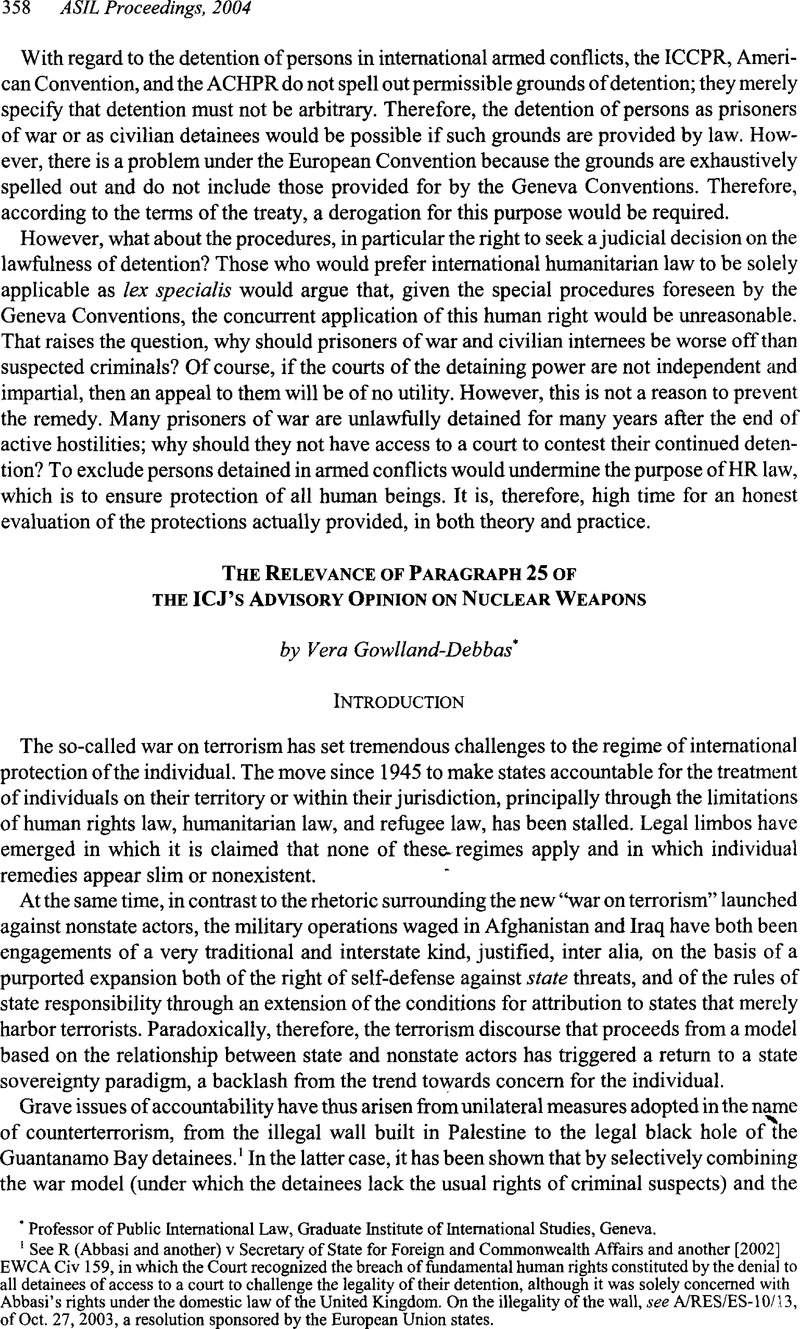Published online by Cambridge University Press: 28 February 2017

1 See R (Abbasi and another) v Secretary of State for Foreign and Commonwealth Affairs and another [2002] EWCA Civ 159, in which the Court recognized the breach of fundamental human rights constituted by the denial to all detainees of access to a court to challenge the legality of their detention, although it was solely concerned with Abbasi ‘ s rights under the domestic law of the United Kingdom. On the illegality of the wall, see A/RES/ES-10/13, of Oct. 27, 2003, a resolution sponsored by the European Union states.
2 Luban, David, The War on Terrorism and the End of Human Rights, 22 Phil. & Pub. Poly Q. 9–14 (2002)Google Scholar.
3 1996 ICJ Rep. My comments are drawn in part from Gowlland-Debbas, Vera, The Right to Life and Genocide: the Court and an International Public Policy, in International Law, The International Court of Justice and Nuclear Weapons 315-37 (Sands, Philippe & de Chazournes, Laurence Boisson eds. 1999)Google Scholar.
4 Ibid.
5 1 Oppenheim’s International Law 1280 (Sir Robert Jennings & Sir Arthur Watts, eds. 9th ed., 2001). It is interesting to note that the 1969 Vienna Convention on the Law of Treaties does not retain this principle.
6 Meron, Theodor, Human Rights in Time of Peace and in Time of Armed Strife: Selected Problems, in Contemporary Issues in International Law: Essays in Honor of Louis B. Sohn 6 (Buergenthal, Thomas, ed. 1984)Google Scholar.
7 In this respect, the views of the Human Rights Committee, the European Court of Human Rights, and the Inter-American Commission coincide. See, e.g., L. Celiberti de Casariego v. Uruguay, No.56/1979, Human Rights Committee, UN Doc. A/36/40, paras. 10.2—10.3 ; Loizidou v. Turkey, Preliminary Objections (Judgment), Eur.Ct.N.R. 23-24 (1996); Coard et al v. the United States, Case No. 10.951, Inter-Am.C.H.R., Report No. 109/99, (1999), para.37. Specifically in the case of the detainees at Guantánamo Bay, see, inter alia, the communication of Mar. 12, 2002 addressed by the Inter-American Commission on Human Rights to the United States Government,”Pertinent Parts of Decision on the Request for Precautionary Measures.”
8 See Application No. 52207/99, ECHR, Grand Chamber, Decision on Admissibility, Dec. 12, 2001, paras. 67 et seq.
9 See Preliminary Report on the Situation of Human Rights in Kuwait under Iraqi Occupation by Walter Kalin, Special Rapporteur, Commission on Human Rights, in accordance with Commission resolution 1991/67, UN Doc. A/46/544 of Oct. 16, 1991, Annex. See also: SCR 237 (1967) establishing that Israel had to observe basic and inalienable human rights even during warfare; UNHCHR, Digest of Jurisprudence of the Un and Regional Organizations on the Protection of Human Rights While Countering Terrorism (2003).
10 See Coard, supra note 7, para.40.
11 The Inter-American Court of Human Rights in the Las Palmeras Case was clearly referring to application, not interpretation, of international humanitarian law by the Inter-American Commission when it admitted the second preliminary exception of Colombia, which alleged that the Commission lacked competence to apply international humanitarian law and other international treaties, since the American Convention limited the competence ratione materiae to the rights embodied in the Convention and did not extend it to those embodied in any other convention. See Case 90, Interam. CH. R., Ser. C (2001), at para. 34.
12 See Human Rights Committee, General Comment No. 29 on Article 4 of the International Covenant on Civil and Political Rights, UN Doc. CCPR/C/21/Rev.l/Add.l 1, (2001), at paras. 9-10.
13 Las Palmeras, supra note 11, at para. 29.
14 The Prosecutor v. Dusko Tadic a/k/a Dule, Decision on the Defence Motion for Interlocutory Appeal on Jurisdiction, ICTY at 54.